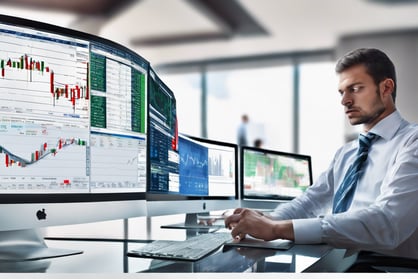Welcome to All Forex Bonus Deals
Education
What is Forex?
is the foreign exchange market or currency market or Forex is the market where one currency is traded for another. It is one of the largest markets in the world.
Some of the participants in this market are simply seeking to exchange a foreign currency for their own, like multinational corporations which must pay wages and other expenses in different nations than they sell products in. However, a large part of the market is made up of currency traders, who speculate on movements in exchange rates, much like others would speculate on movements of stock prices. Currency traders try to take advantage of even small fluctuations in exchange rates.
In the foreign exchange market there is little or no 'inside information'. Exchange rate fluctuations are usually caused by actual monetary flows as well as anticipations on global macroeconomic conditions. Significant news is released publicly so, at least in theory, everyone in the world receives the same news at the same time.
Currencies are traded against one another. Each pair of currencies thus constitutes an individual product and is traditionally noted XXX/YYY, where YYY is the ISO 4217 international three-letter code of the currency into which the price of one unit of XXX currency is expressed. For instance, EUR/USD is the price of the euro expressed in US dollars, as in 1 euro = 1.2045 dollar.
Unlike stocks and futures exchange, foreign exchange is indeed an interbank, over-the-counter (OTC) market which means there is no single universal exchange for specific currency pair. The foreign exchange market operates 24 hours per day throughout the week between individuals with Forex Brokers, brokers with banks, and banks with banks. If the European session is ended the Asian session or US session will start, so all world currencies can be continually in trade. Traders can react to news when it breaks, rather than waiting for the market to open, as is the case with most other markets.Average daily international foreign exchange trading volume was $7.5 trillion in April 2022 according to the BIS triential report
Like any market there is a bid/offer spread (difference between buying price and selling price). On major currency crosses, the difference between the price at which a market maker will sell ("ask", or "offer") to a wholesale customer and the price at which the same market-maker will buy ("bid") from the same wholesale customer is minimal, usually only 1 or 2 pips. In the EUR/USD price of 1.4238 a pip would be the '8' at the end. So the bid/ask quote of EUR/USD might be 1.4238/1.4239.
This, of course, does not apply to retail customers. Most individual currency speculators will trade using a broker which will typically have a spread marked up to say 3-20 pips (so in our example 1.4237/1.4239 or 1.423/1.425). The broker will give their clients often huge amounts of margin, thereby facilitating clients spending more money on the bid/ask spread. The brokers are not regulated by the U.S. Securities and Exchange Commission (since they do not sell securities), so they are not bound by the same margin limits as stock brokerages. They do not typically charge margin interest, however since currency trades must be settled in 2 days, they will "resettle" open positions (again collecting the bid/ask spread).
Individual currency speculators can work during the day and trade in the evenings, taking advantage of the market's 24 hours long trading session.
How to choose a Forex Broker?
Most investors who trade Forex stocks use a broker. A broker is an individual or a company, who buys and sells stocks according to the investor's wishes. Brokers earn money by collecting commissions or fees for their services.You should check that a broker is registered as a Futures Commission Merchant (FCM) with the Commodity Futures Trading (CFTC) as protection against fraud or abusive trade practices. A Forex broker also needs to be associated with a financial institution, such as a bank in order to provide funds for margin trading. Picking the right Forex broker for you will take some work on your part. There are brokers who charge a flat fee and some that charge commission. It may be a good idea to talk with friends and business associates about their brokers. You may get some good leads, and you're certain to hear who to stay away from. There is nothing like word-of-mouth advertising. If you are considering investing online, you could choose several online brokers and contact their help desks. Seeing how quickly they respond to your questions could be key in how they will react to their customer's needs. If you don't get a speedy reply and a satisfactory answer to your question you certainly wouldn't want to trust them with your business. Just be aware that as in other types of companies, pre-sales service might be better than after-sales service. Before you choose an online broker get a copy of their online demo account. What features are included? Is the software reliable? Does it offer automatic trading? Are there extra software features that cost more?
Before setting up an account with a Forex broker you will need to do further investigation. How quickly will these brokers execute your buy/sell orders? What is their policy on slippage? What are the transaction fees? What is the spread, fixed or variable? What are the margin requirements and how are they calculated?
Forecasting of Forex Trading?
Forex trading forecasting is all about trying to predict future movements in currency exchange rates. By analyzing various factors, traders can make informed decisions about buying or selling currencies. There are two main approaches to forex forecasting:
Fundamental analysis: This involves examining economic, social, and political factors that can influence currency values. This includes things like interest rates, inflation, trade balances, political stability, and global events. By understanding these factors, traders can get a sense of which currencies are likely to strengthen or weaken relative to others.
Technical analysis: This approach focuses on analyzing historical price charts to identify patterns and trends. Technical analysts use a variety of tools and indicators, such as moving averages, MACD, and support/resistance levels, to try to predict future price movements.
It's important to remember that forex forecasting is not an exact science. The forex market is complex and influenced by a multitude of factors. Even the most experienced analysts can't predict the future with certainty. However, by using a combination of fundamental and technical analysis, traders can increase their chances of making profitable trades.
Here are some additional points to consider:
Forex forecast polls: These polls aggregate the sentiment of forex experts on where they think currencies are headed. They can be a useful tool to get a sense of market sentiment, but shouldn't be taken as trading advice.
News and events: Major economic news releases and global events can have a significant impact on forex markets. Staying informed about these events is crucial for any forex trader.
Forex Markting Trading Hours:
The Forex market has a huge advantage over the other investment markets - it's open 24 hours a day, six days a week. Whereas the commodities and stock market operates five days a week (Monday through Friday) during normal business hours, the Forex market continues its activity around the clock. If you want to trade at 2:00 am EST Monday morning, feel free to place your trade. If you would like to invest at 9:00 pm Thursday night when you have the time to concentrate on the market, simply place your trade on one of the many online Forex trading systems. However, even though the market is considered a 24-hour market, it's important to know when the market is actually active and when is the best time to place a trade on the market.Even though the Forex market is open 24 hours a day, each financial center (i.e. New York, London, Frankfort, Tokyo, and Australia) has its own operating hours, which are usually from 8:00 am - 4:00 pm, local time. That means if it's 8:00 am (Tokyo time) on Monday morning, the Tokyo market will be open for trading even though it's 10:00 pm EST, on Sunday night. You could therefore take advantage of trading on the Forex market late Sunday night from your New York apartment.
What are Forex Signals?
What are Forex signals? Forex signals are paid services offered by some brokers and independent Forex annalists. Companies that offer forex signals monitor and analyze the market for you, providing you with their data via desktop alerts, email or even SMS and pager alerts.
Forex signal services analyze several factors when preparing their data. They do a technical analysis of market conditions and use a combination of indicators to identify trends and isolate profitable entry and exit points. They then send you the results via the venue of your choice and you can choose to use the signal in your own trading, or pass on it.
Most forex signal services offer signals for only a handful of the most popular currency pairs, such as EUR/USD, USD/JPY, GBP/USD, USD/CHF. Occasionally, you can find specialty services that offer signals for other lesser traded pairs. Forex signals can be costly, even upwards of $100 / mth. The benefit of subscribing to such a service is that they analyze and crunch the data for you, saving you time. It should be noted, however that using a signal service is no substitute for a proper education in the Forex markets. Signal services give you data, you still need to know what to do with it.When shopping for a signal service, make sure that they provide you with historical data so that you can see their track record for yourself. Remember, that like any trader, Forex signal services also have loosing trades. You shouldn't expect a signal service to be a sure ticket to instant Forex wealth, but rather look at them as another tool in your trading toolbox.




